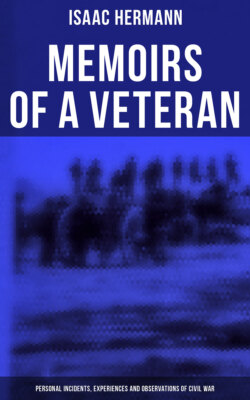Читать книгу Memoirs of a Veteran: Personal Incidents, Experiences and Observations of Civil War - Isaac Hermann - Страница 4
На сайте Литреса книга снята с продажи.
ОглавлениеCHAPTER I.
Table of Contents
A PICTURE.
Entering the post-office for my daily mail, I noticed in the lobby, hanging on the wall, a beautiful, attractive and highly colored landscape and manhood therein displayed in its perfection, gaudily dressed in spotless uniforms; some on horseback, some afoot, with a carriage as erect and healthful demeanor that the artist could undoubtedly produce; he was at his best, setting forth a life of ease and comfort that would appeal to the youngster, patriot and careless individual, that therein is a life worth living for. Even the social features have not been omitted where men and officers stand in good comradeship. Peace and repose, and a full dinner pail are the environment of the whole representation.
It is the advertisement of an army recruiting officer, who wants to enlist young, healthy men for the service of the executive branch of our National Government, to defend the boundaries of our territory, to protect our people against the invasion of a foreign foe, to even invade a foreign land, to kill and be killed at the behest of the powers that be, for an insult whether imaginary or real, that probably could have been settled through better entente, or if the political atmosphere would have thought to leave the matter of misunderstanding or misconstruction to a tribunal of arbitration.
The writer himself was once a soldier; the uniform he wore did not correspond with that of the picture above, it was rather the reverse in all its features. He enlisted in the Confederate service in 1861, when our homes were invaded, in defense of our firesides, and the Confederate States of America, who at that time, were an organized Government.
Usually an artist, when he represents a subject on canvas, uses a dark background, to bring forth in bright relief, the subject of his work. But I, not being an artist, reverse the matter in controversy, and put the bright side first.
OTHER PICTURES.
When in 1861 the Southern States, known as the Slave States, severed their connection with the Federal Government and formed a Confederacy of their own, which under the Federal Constitution and Common Compact, they had a perfect right to do, they sent Commissioners, composed of John Forsyth, Martin J. Crawford and A. B. Boman to Washington, with power to adjust in a peaceable manner, any differences existing between the Confederate Government and their late associates. Our Government refrained from committing any overt act, or assault, and proposed strictly to act on the defensive, until that Government, in a most treacherous manner, attempted to maintain by force of arms, property, then in their possession and belonging to the Confederate Government, and which they had promised to surrender or abandon. But on the contrary, they sent a fleet loaded with provisions, men and munitions of war, to hold and keep Fort Sumter, in the harbor of South Carolina, contrary to our expectations, and as a menace to our new born Nation.
Then, as now, there were State troops, or military organizations, and being on the alert, under the direction of our Government, and under the immediate command of General Beauregard, they fired on the assaulting fleet to prevent a most flagrant outrage, and after a fierce conflict, the Fort was surrendered, by one Capt. Anderson, then in command.
Abraham Lincoln, the then President of the United States, called out 75,000 troops, which was construed by us as coercion on the part of the Federal Government, so as to prevent the Confederates from carrying out peaceably the maintenance of a Government already formed. To meet such contingency President Jefferson Davis called for volunteers. More men presented themselves properly organized into Companies, than we had arms to furnish. Patriotism ran high, and people took up arms as by one common impulse, and formed themselves into regiments and brigades.
The Federal Government, with few exceptions, had all the arsenals in their possession. We were therefore not in a condition to physically withstand a very severe onslaught, but when the Northern Army attempted on July 21, 1861, to have a holiday in Richmond, the Capital of the Confederate States, we taught them a lesson at Manassas, and inscribed a page in history for future generations to contemplate.
So Mounting a Stump, I Proceeded to Introduce Myself.
